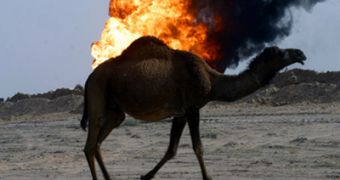That's it.
The World's natural abundance tap is going to turn off.
Between 2008 and 2018, the world will experience a last year of high oil production followed by a constant drop, as it is depicted by a new model made by Fredrik Robelius, a Swedish physicist and petroleum engineer at the University of Uppsala.
In 1956, the American geophysicist M. King Hubbert predicted that U.S. oil reserves would reach a maximum within 20 years and so it happened.
Now this is going to occur globally, even if some oil companies and consultancy firms give a later date, after 2020.
The production decline could trigger major supply and transportation problems as there is still not any ready alternative to petroleum-based liquid fuels.
Previous oil-peak models were based on past rates of total production, estimations of remaining oil reserves and a steady decline rate.
The new research realized field-by-field analyses of the current 333 giant oil fields, delivering over 60 % of today's oil production.
All the smaller fields were treated as a supplementary giant field.
Robelius analyzed the field's past productions and their remaining recoverable reserves.
Based on previous knowledge, he determined a drop-off varying from 6 % in a best-case scenario to 16 % in a worst-case scenario.
He added the effect of new oil sources like the deep ocean and oil sands in Canada, but these sources cannot bias the world production, and the possibility of new giant fields to be found in the future is extremely low.
"Oil geologists have gone to the ends of the Earth to search out big fields, and it's very unlikely that another big one will be found. Even if another huge one is found, it would only put off the peak by a year or so", said Caltech physicist David Goodstein.
"Although there are other potential sources of oil, they are not only smaller, but also frequently have low production rates because of geological constraints. In Canada's oil sands, for instance, the oil is so heavy that it must be heated up before it starts to flow and this is a slow and expensive process", Robelius explained.
Of course, the new analysis caused a big debate. "Not much can be said about additional oil resources because we haven't really started looking for them yet," said Michael Lynch, president of Strategic Energy & Economic Research, an energy consultancy firm in Massachusetts.
"The oil peak lies farther into the future, partially because there's likely to be a lot of oil in as-yet undiscovered smaller fields. You don't go looking for them until you run out of the giant field. Robelius, and others like him suffer from a "perceptual problem-'if I don't see it, it must not be there", he added.
"And new technologies could help solve extraction problems," said Sam Kazman of the Competitive Enterprise Institute, a non-profit public policy think tank in Washington, D.C. "New technologies have turned fields that once seemed to be dormant into steady supplies of oil," said Kazman. "These kinds of approaches rely on resources and technologies that haven't yet been developed or even discovered, which isn't practical," counteracted Robelius.
Many people want new quickly oil sources "without having any evidence whatsoever that that's the case."

 14 DAY TRIAL //
14 DAY TRIAL //